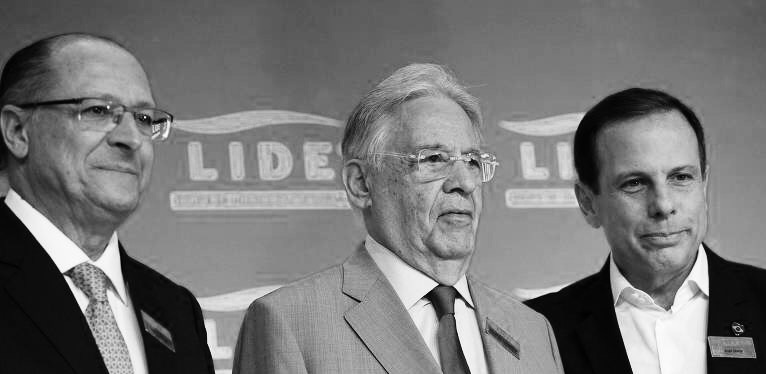Faced with the threat that Bolsonaro poses to the nation’s democratic values – values that the founding leaders of the PSDB fought against during the military dictatorship – history will require that a crucial decision be made, one that draws on the party’s traditions, that is if these traditions still provide any moral guidance for its leaders.
by Ricardo Duwe*
In 1975, during the heat of the conflicts over Brazil‘s re-democratization, the sociologist and future President Fernando Henrique Cardoso raised the question of what commitments Brazilian liberals would have to democracy. According to his diagnostic, they would never show true allegiance to their own principles, because, “in practice, liberals have rarely accepted the burden of liberalism,” emphasizing that “it would be tiresome to recall all the times that, when regimes that liberals considered authoritarian (such as Vargas in 1945) or bureaucratic-populist (such as Vargas in 54 and Goulart in 64) were overturned, they themselves were the first ones to appeal to and rely on the mediating quality of the armed forces.” For that reason, he concluded that Brazilian liberalism would be a form of castrated liberalism, due to the fact that it would “almost always be afraid of freedom and of effective civil society organization and participation.” (Autoritarismo e democratização. Rio de Janeiro: Paz e Terra, 1975. p.176) In other words, his suspicion seemed to suggest that liberalism without the people would be doomed to conservatism and would flirt with authoritarianism.
It looks like the passage of time is proving that the sociologist of the 1970s was correct, and the Partido da Social Democracia Brasileira (Brazilian Social Democracy Party/PSDB) is now a practical example of Fernando Henrique Cardoso’s own theory. Everything indicates that the results of the 2018 elections will consolidate the most significant break between the PSDB and the demands of Brazilian society in the history of the party. It is more and more obvious that the dialogue of the party elites with the Brazilian people is falling on deaf ears.
The party members don’t understand what they did wrong for the people to prefer, according to the latest poll by IBOPE released on September 24, Bolsonaro’s authoritarianism (28%), Haddad’s Lulismo (22%), or Ciro’s national developmentalism (11%), over their candidate Geraldo Alckmin’s icy charisma (8%). On the other hand, the people do not see any reason to believe in the PSDB’s promises. After all, it does not do justice to the word social – as the party enthusiastically supported all of the Temer Government’s anti-people reforms – nor does it do justice to the word democracy, if the unfortunate role that PSDB leaders played in rejecting the results of the 2014 elections is taken into account, conducted in a manner reminiscent of the worst moments of the UDN when that party denied the victories of Getulio Vargas and Juscelino Kubitchek and the rise of Jango Goulart and Brizola during the 1950s and 1960s.
The four consecutive losses to the PT during the last presidential elections deeply impacted the PSDB, to the point that the party abandoned most of its historic goals and a deep debate about the national reality to become, exclusively, a bastion of anti-PT-ism. Without any concrete proposals to solve Brazilians problems, and with a deep absence of dialogue with the poor and working class, the only solid discourse of the PSDB during recent years has been to try to propose an inverted self portrait in relation to the PT: Whatever the PT is, we will be the opposite.
No character better symbolizes what the PSDB has transformed into – this hybrid mixture of anti PT-ism and lack of knowledge of the people’s reality – than the image of the ex-Mayor of São Paulo, João Doria. One minute dressed up in a street cleaner’s uniform downtown, another moment showing his labor card to the cameras apparently to meet a bizarre need to prove that he once held a steady job, and nearly always surfing on the shallowest kind of anti-PT-ism, Doria is the perfect portrait of the current moment of the PSDB: a party with an identity crisis which no longer knows what its role is within the Brazilian party system to the point that it is desperate because it is no longer able to dialogue with the popular classes in our society.

Regarding the current divide between the PSDB and the people, it is worth remembering that the party arose in the context of Brazilian re-democratization, this being the period of the greatest social mobilization in the modern history of the nation. During the year of its founding in 1988, broad sectors of the Brazilian population were unsatisfied with the path that the New Republic was taking, the influence of President José Sarney, the so called “big center” of the National Constituent Assembly and the chronic inflation problem, which had been exacerbated the year before during the failed Cruzado II monetary policy.
Faced with this scenario, PMDB leaders like Fernando Henrique Cardoso, Mário Covas, André Franco Montoro, José Serra, and Luiz Carlos Bresser-Pereira met a popular demand to break from the party and founded the PSDB. Its main promises were to break with the physiology of Brazilian politics and adopt economic practices that mixed liberal proposals of fiscal responsibility and inflation control without abandoning the central role of the State in promoting welfare and income redistribution. These latter proposals were defended by developmentalist actors who were still affiliated with the party at the time, but who would go on to leave it due to disagreements with the conservative turn it was taking, like Ciro Gomes and Bresser-Pereira.
In comparing the past with the current scenario, it may look strange that the international experience which served as the ideal reference point for the recently founded PSDB was the French Socialist Party government led by then President François Mitterand (1981-1995). Mitterand was elected in 1981 by means of a historic coalition between France’s traditional left fronts which included his Socialist Party and the Communist Party which had triumphed with a centrist candidate, then – President Valéry Giscard d’Estaing. The election of Mitterand caused great repercussions around the world as his social-democratic government adopted ground breaking policies such as: abolition of the death penalty, taxation of large fortunes, reduction of the work week to 39 hours, a fifth annual week of paid vacation, nationalizing companies, regional decentralization and reduction of the retirement age from 65-60. How many of these measures are defended by Geraldo Alckmin or João Doria in their 2018 electoral campaigns?
In a recent interview in Estado de São Paulo newspaper, one of the historic leaders of the PSDB, former Governor and current Senator from Ceará, Tasso Jereissati, publicly admitted to a series of errors made in the recent history of the organization. For Jereissati, big mistakes included: 1) challenging the results of the 2014 elections; 2) voting against the basic economic ideals of the party, “just to be against the PT”; and 3) the greatest error of all – joining Michel Temer’s government.
Although the growth of extreme-right fronts is a world phenomenon, in observing the Brazilian case, it is noticeable that most of the former voting base of the PSDB has migrated to the candidacy of Jair Bolsonaro (PSL-Rio de Janeiro). As the PSDB abandoned concrete political proposals, betting all its chips on anti-PT-ism and allying with the worst groups inside the PMDB and the “big center”, the party fell into mistrust by the people and this void was rapidly filled with Bolsonaro’s authoritarian radicalism. According to data obtained in a September 19th survey in São Paulo state, former governor Geraldo Alckmin only has 13% support and is losing by a wide margin to Bolsonaro, who is leading with 30%.
The results of these disastrous and anti-people policies will be collected in the 2018 election. According to current predictions, the PSDB Congressional Bloc will shrink and, even with the most amount of commercial airtime [due to election laws which grant time according to coalition size], Geraldo Alckmin will not make the second round. After 24 years without losing a gubernatorial election in São Paulo, João Doria looks like he will lose in the second round to Paulo Skaf. Faced with this conjuncture and the inability of the party to renew itself, could it be possible to hold an electoral funeral for the PSDB by the end of the year?
A definitively affirmative response to this question would be an exaggeration that would not take into consideration the power that the PSDB will continue to wield within the Brazilian party system after the elections, in which it has a good chance of electing governors in important states like Minas Gerais and Rio Grande do Sul. On the other hand, it is undeniable that, at the moment, the party is experiencing its greatest credibility loss in history. The current image of the party is a deformed and unrecognizable caricature when compared to that what was built on its founding principles in 1988. A comparison with this period is even more meaningful when we remember the fact that in the 1989 presidential elections party founder Mário Covas supported Lula in the second round against Fernando Collor de Mello.
The years passed by and the current context is considerably distinct from 1989. The most likely scenario for the second round will be a run off between Jair Bolsonaro and a candidate from the center-left, like Fernando Haddad or Ciro Gomes. The role of the PSDB in this runoff, independent of what it will be, will have undeniable practical effects on the outcome. But the fact is that, faced with the threat that Bolsonaro poses to the democratic values of the country – values that the founding leaders of the PSDB fought against during the military dictatorship – history imposes a crucial decision to be made, that touches on the traditions of the party, that is if these traditions still provide any moral guidance for its leaders. If the pragmatic and anti-people intransigence of the party elite insists on adapting a position against both Bolsonaro and Haddad or Ciro, the PSDB will, once again, miss the boat of history. This time, the boat will take social democracy and the party traditions with it, leaving the PSDB to fulfill the prophecy that its honorary president made during the 1970s: Liberalism without the people is doomed to fail.
*Ricardo Duwe is a historian who is currently finishing his Doctorate at Universidade Federal de Santa Catarina.
This article originally appeared in LeMonde Diplomatique Brasil, and was translated and reprinted, with consent of the editors, by Brasil Wire.
[qpp]

